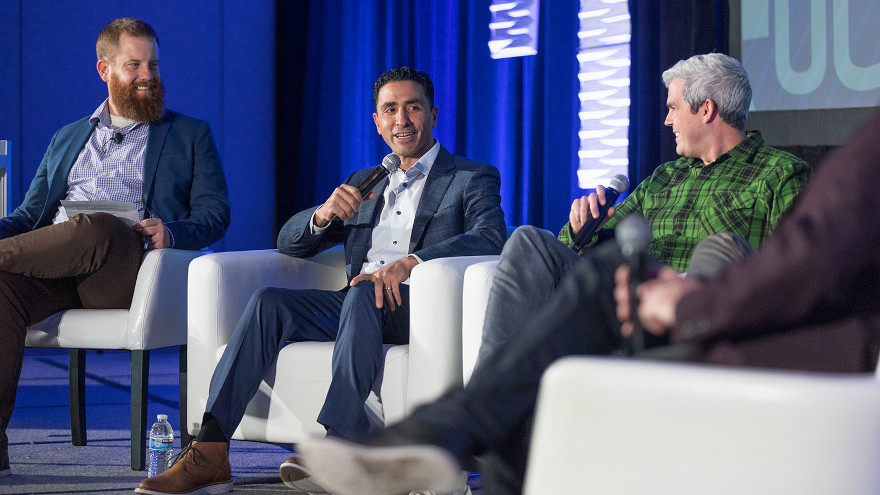ACV invests to be ready for a return to wholesale market growth

ACV CEO George Chamoun (center) during an Auction Technology panel at Used Car Week in San Diego last week. Photo by Jonathan Fredin.
By subscribing, you agree to receive communications from Auto Remarketing and our partners in accordance with our Privacy Policy. We may share your information with select partners and sponsors who may contact you about their products and services. You may unsubscribe at any time.
At a time when many technology companies are cutting back, ACV is investing in both organic growth and acquisitions. Though it expects the wholesale market to remain moribund, that investment will enable it to grow more quickly when markets regain momentum, said ACV executives.
“Based on our internal analysis, we estimate that the U.S. dealer wholesale market continues to remain well below normalized lines and contracted 21% year-over-year in Q3,” ACV CEO George Chamoun said on the company's latest earnings call, adding “despite the macro backdrop, we are executing on key growth initiatives within our control, including gaining market share and attracting new dealers to our marketplace.”
ACV says its auction platform is now used by 33% of franchised dealers in the U.S, an increase of half a percentage point compared to the fourth quarter of 2021.
It attributes that growth to its willingness to invest in in-house innovation and acquire firms that add to the services it can offer dealers. Its goal, said Chamoun in reply to an analyst’s question, is to deliver “on us becoming, at the end of the day, the intelligence platform for the dealer.”
In a phone interview with Auto Remarketing, he holds up Live Appraisal as an example of in-house innovation that is boosting growth. It allows dealers to see what other dealers will pay for a trade-in while the consumer still owns the car.
“This helps (a dealer) know how much to offer the consumer,” said Chamoun.
Subscribe to Auto Remarketing to stay informed and stay ahead.
By subscribing, you agree to receive communications from Auto Remarketing and our partners in accordance with our Privacy Policy. We may share your information with select partners and sponsors who may contact you about their products and services. You may unsubscribe at any time.
ACV will be coming out with an “asset-light consumer offering” based on Live Appraisal, possibly in 2023, said Chamoun. He declined to provide more details during the interview.
Among recent acquisitions is Monk, an AI-powered vehicle inspection company which ACV bought in February. “That will be officially launched at NADA,” said Chamoun.
Also in February, ACV acquired Drivably, a software platform that allows dealerships to buy vehicles directly from consumers.
ACV reported $105 million in third quarter revenue, up 15% compared to the same quarter in 2021. It had an adjusted EBITDA loss of $12 million.
Its unit growth declined 5% compared to the same quarter in 2021. The overall wholesale market unit growth declined 21%.
While the number of dealers and thus listings on its platform grew in the third quarter, the number of listings per lister has started to decline, said Chamoun on the earnings call.
Slowing demand for used cars in the third quarter resulted in a continuing weakening of conversion rates. “We assume wholesale volume and conversion rates will be compressed for the remainder of the year,” said Chamoun.
ACV operates in several segments: Online auction and assurance; marketplace services including transportation and capital; and software-as-a-service and data services.
Transportation and capital accounted for 38% of third quarter revenue and was the fastest-growing segment, up 26% compared to the same quarter in 2021.
Online auction and assurance accounted for 53% of revenue and grew 7% and SAAS and data services accounted for 8% and grew 20%.
ACV sees promise in the transportation business, which currently has margins in the “lower double digits, sustainable into next year,” ACV chief financial officer Bill Zerella said on the earnings call. ACV is targeting transportation margins of 15% by 2026, he said.
ACV will expand its commercial offerings in 2023 because it is “starting to get some traction” with rental companies, said Chamoun. It is also looking into repo companies’ needs, he added.
He sees some signs that the retail market is improving, including the return of rebates. That will mean more trade-ins, thus more used vehicles for auction. ACV hopes its investments will position it to grow when that market rebound occurs.
“None of us know what next year is going to bring us, but we are going to hold ourselves accountable to growth,” said Chamoun.


